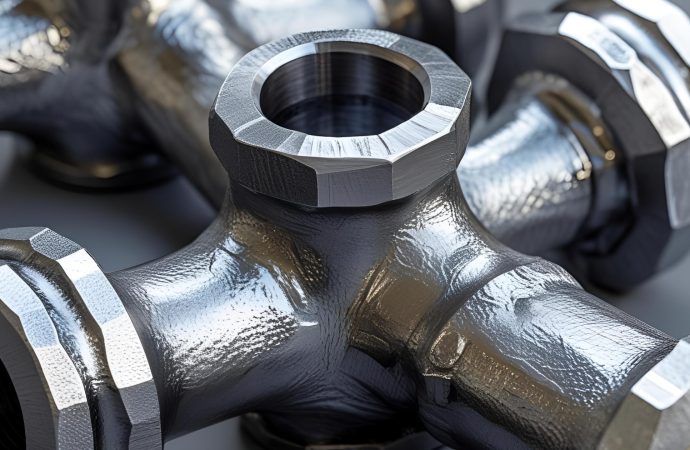Introduction In the modern industrial world, machinery is the powerhouse behind productivity. Whether it’s in manufacturing, construction, oil and gas, or chemical processing, machinery plays a critical role in enabling industries to meet growing demands for speed, precision, and efficiency. However, the reliability and durability of these machines depend not only on advanced design but
Introduction
In the modern industrial world, machinery is the powerhouse behind productivity. Whether it’s in manufacturing, construction, oil and gas, or chemical processing, machinery plays a critical role in enabling industries to meet growing demands for speed, precision, and efficiency. However, the reliability and durability of these machines depend not only on advanced design but also on the quality of individual components that keep them running smoothly.
From rotating shafts and motors to complex piping systems, every part of a machine must perform flawlessly under various operational stresses. One essential yet often overlooked group of components is fittings—the connectors that hold piping systems together. Among them, alloy steel forged fittings are gaining popularity for their superior strength and resistance in harsh industrial environments.
The Backbone of Industry: Machinery That Never Stops
Industrial machinery is engineered to perform repetitive, high-stress operations over long periods. These machines are used for:
- Drilling and extraction in the oil and gas sector
- Heat and chemical processing in the petrochemical industry
- Material handling in construction and mining
- Precision operations in manufacturing lines
In all these sectors, machine failure can lead to costly downtime, safety hazards, and production losses. To avoid such risks, businesses rely on components that offer reliability, high performance, and long service life.
Components That Make Machinery Work
Industrial machines consist of multiple parts, each serving a critical function. These include:
- Motors and Drives: Power the movement of mechanical parts.
- Bearings and Shafts: Enable rotation with minimal friction.
- Valves and Actuators: Control fluid flow and pressure.
- Pipes and Fittings: Transport fluids and gases between machine systems.
While large and visible components like motors often receive attention, smaller parts like fittings play a significant role in maintaining a secure and leak-proof system. Without high-quality fittings, entire fluid or gas systems could fail, leading to catastrophic consequences in industries like oil & gas or chemicals.
The Importance of Forged Fittings in Machinery
Fittings connect sections of pipe and help redirect, control, or seal off flow. Forged fittings are made by shaping metal under extreme pressure, which increases their strength and resistance to wear, pressure, and corrosion.
Alloy steel forged fittings are especially valuable in industries that involve high temperatures and pressures. These fittings are created using alloy steel, which is enhanced with elements like chromium, molybdenum, and nickel. This composition gives them higher tensile strength and resistance to heat, oxidation, and chemical attack compared to standard carbon steel or stainless steel.
These properties make alloy steel forged fittings ideal for machinery used in power plants, chemical reactors, pressure vessels, and heavy-duty hydraulic systems.
Key Benefits of Using Alloy Steel Forged Fittings in Machinery
-
Superior Strength: Alloy steel fittings can withstand extreme mechanical loads and vibrations. This strength ensures a secure connection between pipes, even under fluctuating pressure conditions.
-
Resistance to Corrosion and Heat: Machinery used in steam systems, chemical plants, or refineries often faces corrosive substances and high operating temperatures. Alloy steel provides excellent protection against both, extending the life of machinery.
-
Leak-Proof Operation: Precision forging techniques produce fittings with tight tolerances and smooth finishes, ensuring reliable sealing and reduced risk of leaks.
-
Long-Term Cost Savings: Though the initial cost of alloy steel may be higher than other materials, its durability and low maintenance requirements make it a cost-effective solution over time.
Real-World Applications in Machinery Systems
1. Oil & Gas Equipment
In drilling and refining operations, machinery is exposed to corrosive fluids and high-pressure steam. Alloy steel fittings are used in pump connections, pipeline systems, and high-temperature manifolds.
2. Power Plants
Steam turbines and boilers rely on robust piping systems. Forged alloy steel fittings ensure secure and heat-resistant joints in high-pressure steam lines.
3. Chemical Processing Units
Aggressive chemical agents require machinery that can resist corrosion. Alloy steel’s ability to hold up under chemical exposure makes it ideal for mixers, heaters, and reaction chambers.
Maintaining Machinery with Quality Components
Even the most advanced machines require regular inspection and maintenance. Components such as bearings, seals, and fittings wear out over time, and replacing them with low-quality parts can compromise the entire system. Using certified, high-grade parts especially for critical connections ensures safety, compliance, and extended machine life.
When selecting machine components, engineers should always consider factors like pressure rating, temperature range, compatibility with transported materials, and environmental exposure. Trusted suppliers of industrial fittings can provide documentation, testing data, and guidance on choosing the right products for specific applications.
Final Thoughts
Machinery is the lifeline of industrial production, and every part—no matter how small—contributes to its overall performance. By choosing components that are engineered to handle extreme conditions, industries can reduce maintenance needs, enhance efficiency, and avoid unexpected failures.
For systems that operate under pressure and temperature extremes, materials like alloy steel forged fittings offer unmatched durability and reliability. As industries continue to grow and evolve, the focus on high-performance, precision-engineered machine parts will remain central to operational success.
















